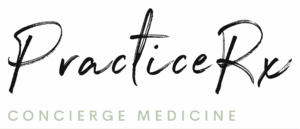
You’ll discover:
-
What paying directly means for your care
-
How insurance affects doctors’ time and decision-making
-
The benefits of a membership model for both doctor and patient
-
Why you’ll still need hospital insurance even with concierge care
-
How to evaluate if concierge care is the right fit for you
If I’m being honest, one of the hardest questions I get from new patients is: “So, you don’t take health insurance?” They say it like a kid asking for ice cream even though they didn’t eat their dinner. They know the answer already and bracing themselves mentally for it.
Here’s what I think when I hear that: Yes, we can definitely take care of your health, but without insurance. And does your insurance really take care of you anyways? That’s a different story.
Why Insurance Doesn’t Align With The Way we Practice (And The Way You Want to be Taken Care of)
In the old model, a primary care doctor (or NP like me) sees anywhere between 2,000-3,000 patients. Appointments are short, follow-up is limited, and the driving force is reimbursement for quantity rather than time with each patient. I call this the Costco Model of Medicine- it’s all about bulk care delivery.
When you accept insurance, you become part of a reimbursement machine. Claims get submitted, coding rules apply, billing staff multiply, and much of the visit becomes about documentation rather than conversation. For me, that creates two problems:
-
My time is diluted.
-
My decisions are subtly framed by what will “get paid,” not necessarily what’s best.
By stepping out of that model and into Concierge Medicine in AZ, I freed up my practice to spend more time with you, dig into root causes rather than cover symptoms, and make quicker decisions based on your individual needs and not what an insurance code dictates.

What the Membership Fee Actually Covers
1. Same-day or next-day visits via text, call, or in-office
When something feels off, you shouldn’t have to wait weeks to be seen. Having a concierge doctor in Scottsdale, AZ makes it easy to get answers quickly. Even if you’re not in Scottsdale, we can see you virtually wherever you are, send an Rx to your local pharmacy, and even give you bloodwork requisitions to a local lab. Whether it’s a message, phone call, or in-person visit, your doctor knows you, your history, and your context. It’s personal, fast, and built around you, not a scheduling algorithm.
2. Extended appointments that go beyond 15 minutes
You can’t cover real health in fifteen minutes. In concierge medicine, visits are intentionally longer so we can talk through not just what’s happening, but why. This is why we say PracticeRx Concierge Medicine is a Functional Health clinic. We can discuss sleep, stress, hormones, or nutrition without watching the clock. That extra time is what allows real prevention and connection to happen.
3. Direct access to your provider without gatekeepers or triage layers
This one is a patient favorite. We have a dedicated “Members Only” number that is secure and allows our patients to call, text, send pictures of that oozing rash or whatever you have going on. This line is monitored by our providers 8am to 8pm 7 days a week! No hold music, no “we’ll have the nurse call you back.” When you reach out, you’re talking directly to your provider. That connection builds trust, accountability, and a sense of partnership that’s missing in the traditional system. It’s the difference between feeling like a number and feeling like a patient again.
4. Proactive wellness planning
Concierge medicine isn’t reactive; it’s strategic. We look at the full picture with comprehensive labs, including our custom 100+ biomarker functional health screening (see our home page for a sample report), hormone analysis, and long-term data trends that traditional insurance never covers.
From optimizing sleep and mood to balancing hormones and exploring regenerative treatments, the goal is to help you stay ahead of disease instead of chasing it.
Think of insurance like your roof. It protects you when there’s a storm. Concierge care helps you build that roof, strengthen the foundation, and keep it maintained so those storms have less impact when they come.
Have a Question?

Why Insurance Still Plays a Role
This model isn’t necessarily replacement for health insurance. You’ll still want a plan for emergency care, hospitals, and some specialist visits (we do offer a full service mental health practice) because those services are outside the purview of your membership.
If you skip insurance entirely, you’re taking a lot of risk. This practice is only better if you have both: the membership for smarter, faster primary care, and insurance for catastrophic care.
Health share plans are often a great supplement for our concierge patients.
So, is Concierge Care Right for You?
This model isn’t for everyone. It makes the most sense if you:
-
Value time with your doctor and less time filling out forms
-
Want deeper partnerships around your health, not just “come in when you’re sick”
-
Still carry insurance for ER visits, hospitals, and major specialist care
-
Are willing to assume the membership fee in exchange for more control and predictability
If you’re just looking for someone to order your labs and refill your meds, the traditional model may suffice. But if you’re ready for different, you might be ready for concierge.
Final Thoughts by Dr. Clay Hall, NP- PracticeRx
If you can’t tell by now, I am biased for pro-hormone care for women,. This is because it works, its safe when done with someone who knows what their doing (AKA me), and I’ve seen all the good that comes from empowering women to feel better and be more confident in life. If you’re reading this and wondering if your symptoms might be hormone-related, I encourage you to listen to that little gut instinct. Whether it’s weight gain, low sex drive, broken sleep, hot flashes, or just that nagging sense that something feels off… you deserve answers. And solutions.
I decided to build my practice this way because I was tired of saying, “I’ll see you in a month.” I was tired of wishing I had more time to ask the question, “What really changed this year?”
When you know your provider has fewer patients and no insurance-rubber-stamp to hit, things change. It becomes a relationship instead of a transaction.
If you’ve ever wondered if your care could feel different, let’s talk about whether concierge medicine is the right path for you.
If you have questions, or would like to discuss this further, please book a free consultation.
Feel Good. Live Better.
–Clay

